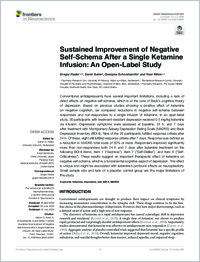Sustained improvement of negative self-schema after a single ketamine infusion: an open-label study
- Hasler, Gregor Psychiatry Research Unit, University of Fribourg, Villars-sur-Glâne, Switzerland - Translational Research Center, University Hospital of Psychiatry and Psychotherapy, University of Bern, Bern, Switzerland
- Suker, Samir Translational Research Center, University Hospital of Psychiatry and Psychotherapy, University of Bern, Bern, Switzerland
- Schoretsanitis, Georgios Psychiatry Research, The Zucker Hillside Hospital, Northwell Health, Glen Oaks, NY, United States
- Mihov, Yoan Psychiatry Research Unit, University of Fribourg, Villars-sur-Glâne, Switzerland - Translational Research Center, University Hospital of Psychiatry and Psychotherapy, University of Bern, Bern, Switzerland
- 01.07.2020
Published in:
- Frontiers in Neuroscience. - 2020, vol. 14, p. 687
English
Conventional antidepressants have several important limitations, including a lack of direct effects on negative self-schema, which is at the core of Beck’s cognitive theory of depression. Based on previous studies showing a positive effect of ketamine on negative cognition, we compared reductions in negative self-schema between responders and non-responders to a single infusion of ketamine. In an open-label study, 26 participants with treatment-resistant depression received 0.5 mg/kg ketamine via infusion. Depression symptoms were assessed at baseline, 24 hours, and seven days after treatment with Montgomery-Åsberg Depression Rating Scale (MADRS) and Beck Depression Inventory (BDI-II). Nine of the 26 participants fulfilled response criteria after 24 hours. Of these, eight still fulfilled response criteria after seven days. Response was defined as a reduction in MADRS total score of 50% or more. Responders improved significantly more than non-responders both 24 hours and seven days after ketamine treatment on the following BDI-II items: item 1 (“Sadness”), item 7 (“Self-Dislike”), and item 8 (“Self-Criticalness”). These results suggest an important therapeutic effect of ketamine on negative self-schema, which is a fundamental cognitive aspect of depression. This effect is unique and might be associated with ketamine’s profound effects on neuroplasticity. Small sample size and lack of a placebo control group are the major limitations of this study.
- Faculty
- Faculté des sciences et de médecine
- Department
- Master en médecine
- Language
-
- English
- Classification
- Biological sciences
- License
-
License undefined
- Identifiers
-
- RERO DOC 328926
- DOI 10.3389/fnins.2020.00687
- Persistent URL
- https://folia.unifr.ch/unifr/documents/308866
Statistics
Document views: 169
File downloads:
- pdf: 194
